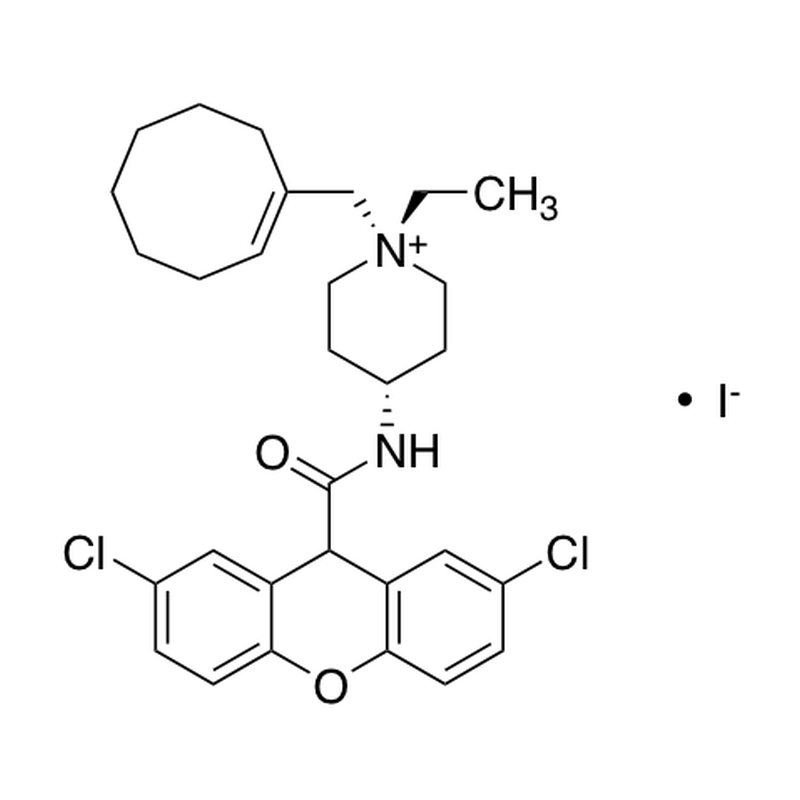产品
编 号:F333501
分子式:C30H37Cl2IN2O2
分子量:655.44
分子式:C30H37Cl2IN2O2
分子量:655.44
产品类型
规格
价格
是否有货
10mM*1mL in DMSO
询价
询价
1mg
询价
询价
5mg
询价
询价
10mg
询价
询价
50mg
询价
询价
结构图

CAS No: 353791-85-2
产品详情
生物活性:
J-113863 is a potent and selective CCR1 antagonist with IC50 values of 0.9 nM and 5.8?nM for human and mouse CCR1 receptors, respectively. J-113863 is also a potent antagonist of the human CCR3 (IC50 of 0.58 nM) , but a weak antagonist of the mouse CCR3 (IC50 of 460 nM). J-113863 is inactive against CCR2, CCR4 and CCR5, as well as the LTB4 or TNF-α receptors. Anti-inflammatory effect.
体内研究:
J-113863 (3-10 mg/kg;腹腔注射;每天一次;持续 11 天;DBA-1 雄性小鼠) 处理可改善关节炎小鼠的足部炎症和关节损伤,并显著减少细胞浸润到关节中。Animal Model:DBA-1 male mice (10-12 weeks) induced with Collagen
Dosage:3 mg/kg, 10 mg/kg
Administration:Intraperitoneal injection; once daily; for 11 days
Result:Improved paw inflammation and joint damage, and dramatically decreased cell infiltration into joints.
体外研究:
修饰的安卡拉痘苗病毒 (MVA) 而不是 MVA 和痘苗病毒 (VACV) 感染的 MH-S 细胞增加了 CXCR2 作用趋化因子 CXCL2 的表达。MH-S 细胞组成型产生 CCL2 和 CCR1 趋化因子 CCL3、CCL5 和 CCL9。因此,模拟处理和病毒感染的 MH-S 细胞的上清液在相同水平上诱导鼠类早幼粒细胞 MPRO 细胞和人单核细胞 THP-1 细胞的趋化性。然而,MVA 感染的 MH-S 细胞的上清液显著增加 CCR2 缺陷型人单核细胞系 U-937 的趋化性。J-113863 可抑制上述所有细胞类型的趋化性。
J-113863 is a potent and selective CCR1 antagonist with IC50 values of 0.9 nM and 5.8?nM for human and mouse CCR1 receptors, respectively. J-113863 is also a potent antagonist of the human CCR3 (IC50 of 0.58 nM) , but a weak antagonist of the mouse CCR3 (IC50 of 460 nM). J-113863 is inactive against CCR2, CCR4 and CCR5, as well as the LTB4 or TNF-α receptors. Anti-inflammatory effect.
体内研究:
J-113863 (3-10 mg/kg;腹腔注射;每天一次;持续 11 天;DBA-1 雄性小鼠) 处理可改善关节炎小鼠的足部炎症和关节损伤,并显著减少细胞浸润到关节中。Animal Model:DBA-1 male mice (10-12 weeks) induced with Collagen
Dosage:3 mg/kg, 10 mg/kg
Administration:Intraperitoneal injection; once daily; for 11 days
Result:Improved paw inflammation and joint damage, and dramatically decreased cell infiltration into joints.
体外研究:
修饰的安卡拉痘苗病毒 (MVA) 而不是 MVA 和痘苗病毒 (VACV) 感染的 MH-S 细胞增加了 CXCR2 作用趋化因子 CXCL2 的表达。MH-S 细胞组成型产生 CCL2 和 CCR1 趋化因子 CCL3、CCL5 和 CCL9。因此,模拟处理和病毒感染的 MH-S 细胞的上清液在相同水平上诱导鼠类早幼粒细胞 MPRO 细胞和人单核细胞 THP-1 细胞的趋化性。然而,MVA 感染的 MH-S 细胞的上清液显著增加 CCR2 缺陷型人单核细胞系 U-937 的趋化性。J-113863 可抑制上述所有细胞类型的趋化性。
产品资料

